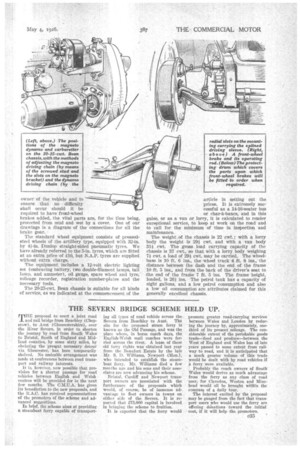THE SEVERN BRIDGE SCHEME HELD UP.
Page 19

If you've noticed an error in this article please click here to report it so we can fix it.
THE proposal to erect a joint road and rail bridge from Beachley (Chepstow), to Aust (Gloucestershire), over the River Severn, in order to shorten the journey by road from South Wales to Bristol, South of England and Midland counties, by some sixty miles, by obviating the prespt necessary detour via Gloucester, has been temporarily shelved. No amicable arrangement was made at conferences between road transport and railway interests.
It is, however, now possible that provision for a shorter passage for road vehicles between English and Welsh centres will be provided for in the next few months. The C.M.U.A. has given its benediction to the new proposals, and the R.A.C. has received representatives of the promoters of the scheme and advanced suggestions.
In brief, the scheme aims at providing it steamboat ferry capable of transport
ing all types of road vehicle across the
Severn from Beachley to Aust. The site for the proposed steam ferry is known as the Old Passage, and was the place where, in horse, coach days, the English-Welsh mail coaches were ferried across the river.A lease of these old ferry rights was obtained last year from the Beaufort Estate by the laic Mr. S. D. Williams, Newport -(Mon.), who intended to establish the steamboat ferry. Mr. Williams died a few months ago and his sons and their associates are now advancing his scheme.
Bristol, Cardiff and Newport transport owners are associated with the furtherance of the proposals which would, of course, be of immense advantage to fleet owners in towns on either side of the Severn. It is reported that £75,000 capital is involved in bringing the scheme to fruition.
It is expected that the ferry would
promote greater road-carrying services between Wales and London by reducing the journey by, approximately, onethird of its present mileage. The considerable extent of the perishable goods trade—food and produce—between the West of England and Wales has of late years passed to some extent from railway to road, and it is anticipated that a much greater volume of :this trade would be dealt wifla by road vehicles.if a ferry were available.
Probably the coach owners of South' Wales would" derive as much advantage from the ferry as any class of road user, for Clevedon, Weston and Minehead would all be brought within the' compass of a daily tour.
The interest excited by the proposal may be gauged from the fact that transport users who would use the ferry are offering donations toward the initial cost, if it will help the promoters.
































